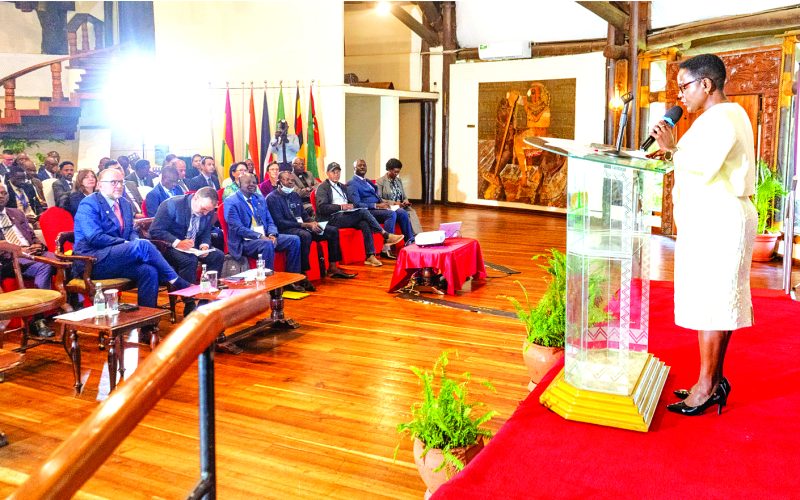State starts reforms to improve inmates health

The government has been compelled to establish a new Correctional Service Legal Order to enable it to address the challenges related to healthcare services for prisoners, especially those in detention.
Subsequently, through the Ministry of Interior, the government has started revising relevant legislation it believes will inspire reform that will entrench human rights laws.
Yesterday, Correctional Services Principal Secretary, Dr Salome Muhia- Beacco outlined some of the efforts towards the legal reforms it is taking to have a comprehensive package to address the health challenges among prisoners that are seen to be rising.
While officially opening a three-day meeting on African health in detention in Nairobi, the PS revealed that the new legal order aims to establish a new pathway for national laws and policies to facilitate healthcare intervention in confinement centres.
“Our detention facilities are vulnerable as possible epicenters for infectious diseases because of higher levels of risk factors for infection including close proximity in often overcrowded spaces,” Muhia- Beacco told delegates attending the conference, the first of its kind.
The International Committee of the Red Cross (ICRC) - which is hosting the conference - revealed that overcrowding in state prisons had decreased substantially since the onset of the Covid-19 pandemic – from 51 to 21 percent, but the problem has since shifted to temporary detention centers, hitting critical levels.
Decent living conditions
According to Terry Hackett, ICRC’s Head of Division in charge of Persons Deprived of Liberty, Protection and Essential Services department, the state prisons also continue to have trouble ensuring detainees have decent living conditions and access to the basic services, such as health care, water, food, hygiene and sufficient space.
“In addition, prison infrastructure is often deficient and poorly maintained, and consequently, these places and other custodial settings remains an integral division in public health management, where we need critical intervention that will provide the right to health for those who have been detained,” Hackett said, proposing a number of key principles if applied will sufficiently address the problem.
He wants players in the correctional department to do away with dehumanisation of people deprived of liberty, and those who have been detained not to be seen as just people, but rather a fellow human being who is vulnerable.
“To realise the World Health Organisation definition of health in place of detention, the humanity of people deprived of liberty must be strengthened,” he said, noting it is important to listen to people who have been incarcerated.
Hackett pointed out that the infrastructure of prisons must be designed properly to provide ventilation and space in relation to the number of detainees held there, acknowledging that the population of people incarcerated has been rising recently.
Ongoing reforms
However, to address this issue, the PS noted that in the ongoing reforms the government has an obligation to implement legislation, policies, and programmes consistent with international human rights norms, and to ensure that prisoners are provided with a standard of health care equivalent to that available in the outside community.
“Currently, health care issues for detainees with mental health among other psycho-social challenges including Tuberclosis and HIV, remain critical particularly when viewed through the lenses of confinement,” she said.
But this is also hampered by the lack of personnel, education and rehabilitation programmes, which have a negative impact on social reintegration.
“Among those who are currently in detention, certain groups, such as older adults, people with disabilities and people with mental health issues are more vulnerable because of the lack of a differentiated approach to their problems,” she said.
According to Dr Elena Leclerc, coordinator of Healthcare in Detention Programme at the ICRC in Geneva, people in places of detention often come from vulnerable socio-economic backgrounds, and may have had limited access to health care even outside of prison.
“These people’s health may be in a poorer state than the general population, and once in prison the conditions may exacerbate that,” she said in an interview.
She said that such people have limited access to health care, less food than would be ideal nutritionally, and of course overcrowding that leads to higher chances of transmission of disease because of proximity to others.
Dr Leclerc noted that such places like prisons in many countries have weaker health care systems compared with the outside, meaning people have less care inside prison, and if an infectious disease such as TB hits, then the demand for medical services among this vulnerable population will be quite high. In many cases such as in Kenya, the prison health system may not have the capacity, the medical supplies and human resources, in particular, to respond to the demands.
Despite these challenges, Commissioner General of Prisons, John Warioba noted there has been incredible resilience and innovation within the prison facilities in the country, and the communities around them.
“It is this resilience and capacity for innovation that we seek to harness and amplify through our discussions and collaborations over the coming days,” he said.



